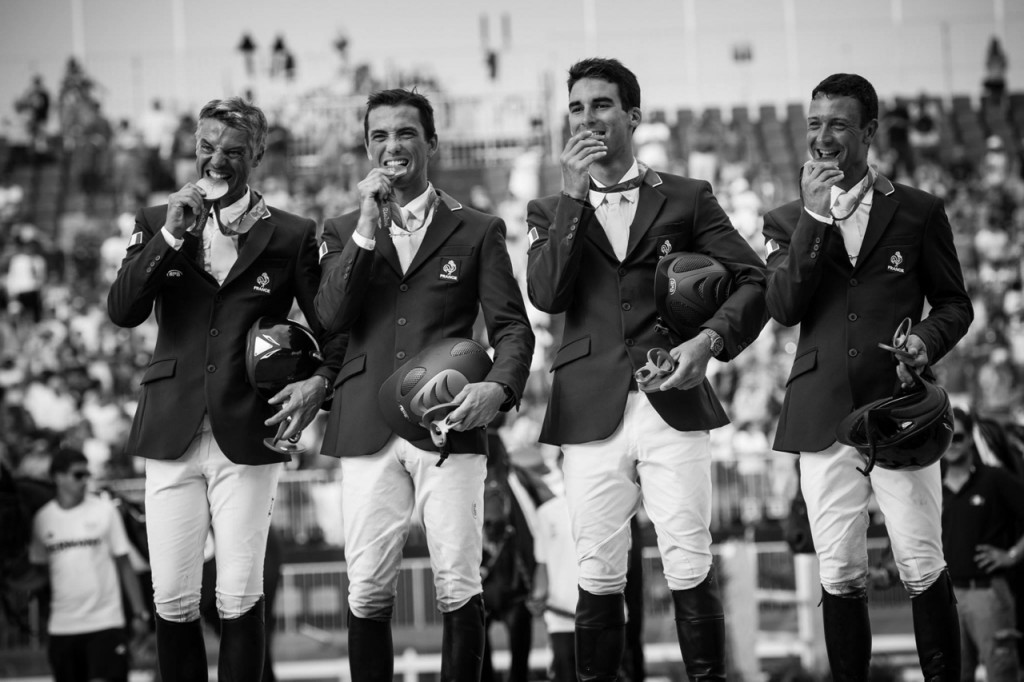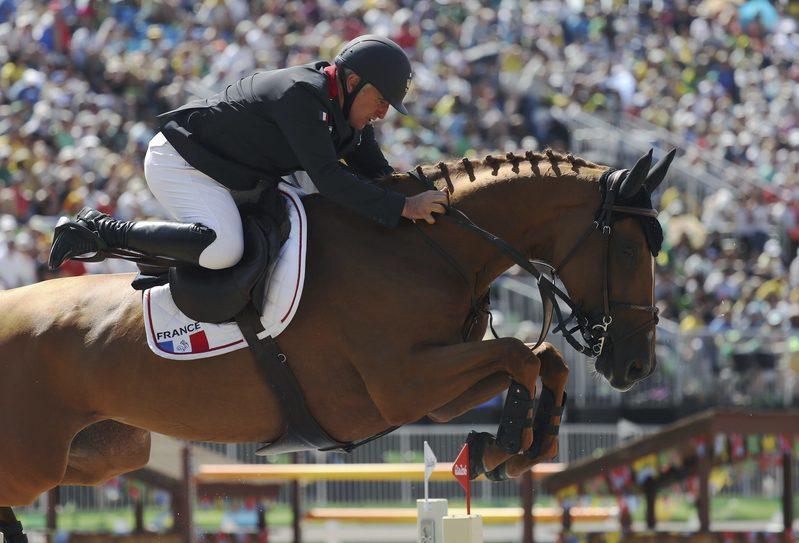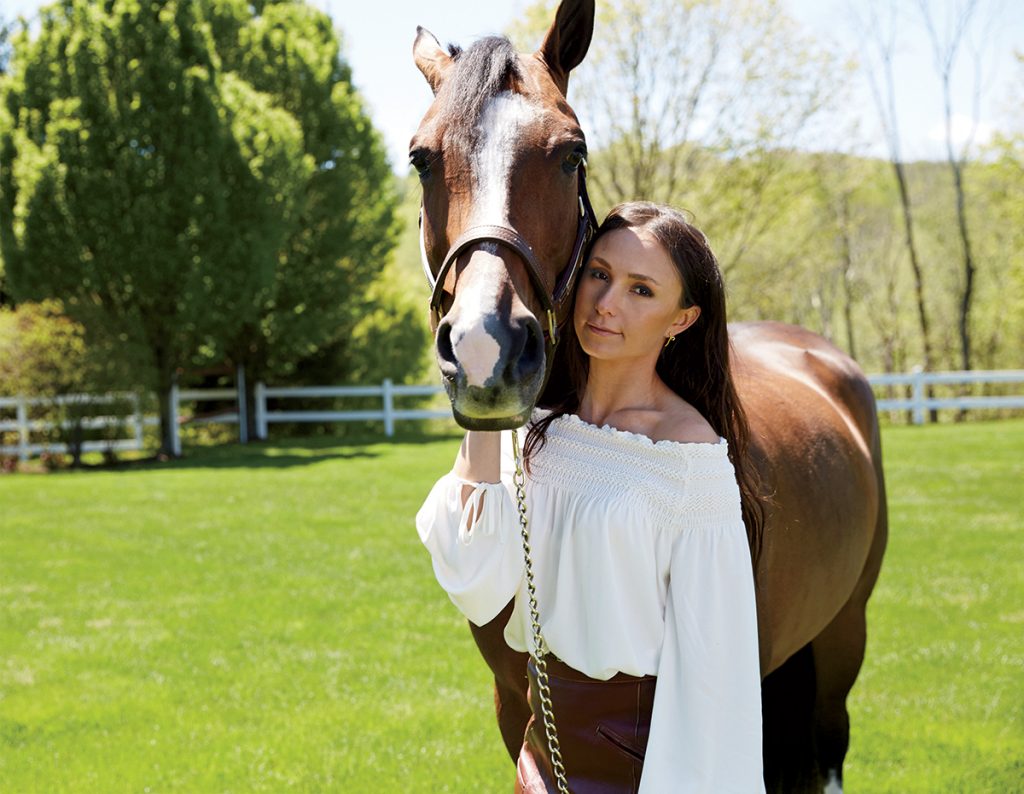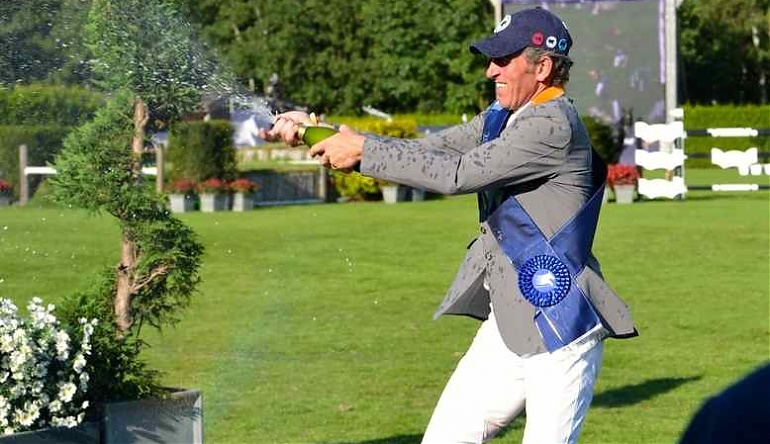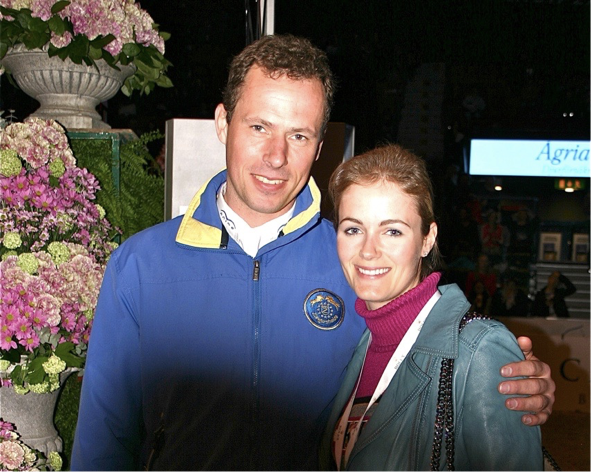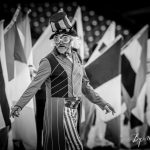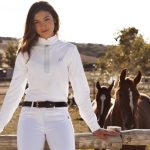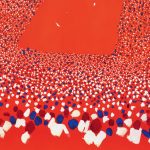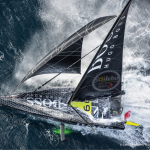Athletes are always fascinating to interview as they push their limits to achieve their goals. Not least the show jumpers who literally fly over the highest fence.
By Camilla Alfthan
AS A MEMBER of the national, French équipe for over 20 years, Roger-Yves Bost is one of the most popular characters of the show jumping caravan who grew up at Haras du Bruly near the Fontainebleau, where his family has run an equestrian centre for decades.
What singles you out is that you have a style apart.. That’s what’s good; that I’m different from the others.
We all ask the same thing of the horse when we ride, and I acquired a style when I was a child competing on poneys. I had to win and I rode all sorts of poneys, so I tried hard to win. And before that I tried to emulate many different riders. That means that I have a style that is mixed.
And different.. My style depends on the horses. I try to have a large assortment of different techniques that I can change if I need to. The horses are very important, they are the ones who have to jump, so I must not annoy them, I must do my best so the result is the best.
You’re always very concentrated on the course..Yes, I walk the piste for quite a while. I’m concentrating on the objective and each obstacle, one by one, and that makes all the difference. I’m very focused and that’s very important in the ring, to concentrate on each obstacle and not touch the bar. To ride well so the horse will give more. I have a lot of technique. It’s like a pianist who is all alone and who has a lot of experience. My repertoire comes all by itself when it is needed and I can concentrate on the ride and the strides.
“It’s like a pianist who is all alone and who has a lot of experience. My repertoire comes all by itself when it is needed and I can concentrate on the ride and the strides.”
How important is the horse compared to the rider? That is difficult to say. There are highs and lows to an extent that is different from any other sport. If you have a good horse it is easier, perhaps you can say the horse is 70 per cent of the performance and on a bad day it is fifty-fifty.
Who influenced you the most? I had many different trainers, Robert Breul who taught me the basics and Jean d’Orgeix who had a lot of technique and who taught me a lot about the turns, Nick Skelton I watched a lot. My favorite is Nick Skelton with the mind of Ludger Beerbaum. There’s Rodrigo who is also exceptional.
There are so many now. It changes every two to three months and level goes up all the time.
You really have to be motivated as it changes very quickly and the young riders at 25-30 are very strong, they have a physical shape that makes it easier for them. We who are older have the experience but we have to continue to work to stay on the top.
Why this change? There’s more more money in the sport and everything goes faster. People arrive with horses that are better and everything is prepared in a better way. Their training is better, so generally, everything has gone up. On the other hand, if you were good ten-fifteen years ago you can still be a good rider, age is not a problem. ©
Not competitive like most girls are
The daughter of Michael Bloomberg was put into this world to be around animals – and to stand up for them, she tells.
” AS A KID I loved the freedom to get out and get dirty and run around with my friends. Once I started competing I really loved the competition side of it. If I didn’t compete I wouldn’t ride. I don’t do this for fun, I do this because I want to compete,” told Georgina Bloomberg between classes at the EEM Masters in Paris.
You were very young when you started..I was four when I started riding and six when I started competing. My older sister rode a little bit and that’s why I started so early because I wanted to do everything that she did.
What was it about the sport that seduced you? The competition side of it. I think you have to enjoy it to a certain level in order to do it well but for me I loved the competition, and I fell in love with that, and wanted to ride more and more. I’ve always been competitive when it comes to sports. I’m not competitive in the ways most girls are, but for sports I am. I love all sports. To be able to work hard at something and then go in the ring and have a pay off.
“I love all sports. To be able to work hard at something and then go in the ring and have a pay off.”
Are you a bad loser?(Laughs) Honestly, I think in this sport you can’t be a bad loser because you are going to lose so many more classes that you will win. And I think that is one thing that the sport has actually taught me – to become a very gracious winner and loser. I think it is so much harder to be a gracious loser but I’ve gotten a lot of practise in the last few years. I think that you have to appreciate the good days, but really not let the bad days get to you so much.
What is your first memory ? A walk trot class. And I could not get my pony to trot. I was six. I remember being so angry about it. I could only go on from there. I only did hunters when until I was 18. And then I decided that I wanted to start jumpers. It was the challenge of something new, and I thought there was more potential in it. My first major competition was the Young Rider competition – that’s what made me fall in love with show jumping. I wanted to make the US team and come to Europe and show.
How many Grand Prix have you since won? I don’t know. But I’ve kept most of my trophies and I have no shame in displaying them in my home because I’m very proud of them.
You’ve had some really bad falls, and yet you came back. Yeah, the last couple of years I’ve had a lot of injuries and bad luck, horses going lame. The last couple of years have been a bit of a struggle. But I decided to do back surgery which was a very important decision for me – to say that I want to come back stronger and give this sport one more shot. I’ve had a lot of bad falls, but you know; it’s something I’ve never been scared of, and I always wanted to come back.
That’s what’s interesting about horse riding – you always get back in the saddle. Yes. It doesn’t always make a lot of sense. But we do. It’s a risk that we know is there when we get on a horse. If you start getting scared then it is time to do something else. But I never let it get to me too much. I’m not done in this sport yet and I want to give it another shot. It’s gonna take more than a few broken bones to keep me out of it.
“It’s gonna take more than a few broken bones to keep me out of this sport.”
You’re father always supported you. We’re always very supportive of each other though we do different things. He’s obviously not a horse show person and he doesn’t quite understand the sport. Hopefully, if we bring the show to New York he’ll come and see it at this level, which I think he hasn’t before.
It could also be great for the city. I’d love to get people who usually don’t get a chance to see show jumping to see our sport so they’ll understand it is not an elitist sport. It is a real sport. It’s gonna get us a lot of exposure, and show people how hard we work and how exiting this sport can be. You make a lot of sacrifices. You’re around six days a week and it is very time consuming when you travel a lot.
You ride mostly in the States. Yes, but before that I went to Germany in the summers and that was a great expercience. I enjoy riding in Europe, even if it is a small show, to see how well run they are, and also to be able to ride against people who’m I’ve admired.
Do you have a favourite? I think Marcus Ehning is an amazing rider, I love his style, and he’s a great fighter. He’s very quiet on the horse and let’s it jump. You don’t notice his body or hand, he’s very elegant. I have to be a little careful with the horses I choose. I have to be able to get along with them, and they can’t weigh a ton, because I’m on the smaller side. I go to the gym so that I can be as strong as possible.
So bonding is also a part of it? Yes, I get very attached and I form a relationship with them. And I always think I don’t have a lot of natural talent. I have to work very hard at it. So for me, I really have to forge a relation with the horses. Then, unfortunately, you get attached and if you’re supposed to sell a horse it is hard. I always have troubles letting go.
Does it happen a lot? Yes, we have to sell a little bit in this business and I have to make some sort of money so we’ve sold a few. But some that I should have sold I did not.
You’ve said you’d never spend a fortune on a horse. I like buying horses and do all the work myself. A lot of people think, ‘You can afford to go out and buy an expensive horse, why don’t you?’ For me, morally, I’d never want to do that. Just because you can afford something it doesn’t mean you have to go out and buy it. I want to work my way to the top in this sport, and not buy it. I’m also doing a lot charity work to know what that kind of money could do for something else. So I can’t ever justify spending that on a horse.
“Just because you can afford something it doesn’t mean you have to go out and buy it.”
Your father’s position (in politics) also makes it difficult. Exactly. And just for myself I morally can’t do it. And if that will keep me from the top of the sport; so be it. I’d rather feel good about myself as a person than reaching the top as a rider.
You also love dogs..I have five rescue dogs and I also just rescued a pig. (Laughs) He’s very smart, and he’s house clean. He was at a compound in New Jersey and needed a home so I adopted him last week.
Tell me about the books that you wrote. There’s a little bit of me in every one of them. The Tommy character most people find is me, and I’m honoured because she is the most down to earth, hard working and kindest person. But it is about a general experience of things that have happened to me or friends.
What were your reasons for writing them? When I was approached about this, I first said no, because I never really enjoyed writing. But when I thought about it, I realised it was the first time I’d have the opportunity to write about something I know so well and love. And when you’re doing something that you love it’s actually fun. I did it with a co writer, and the first book was the hardest. But then we came up with the characters, and after that, it all came very naturally. I knew where they’d go from there and what would happen to them. Every book gets easier and easier. We’re in talks about making a television series. There’s a little bit of romance, and a little bit of everything. It’s about teenagers in the horse show world and the things and the drama that happens there…The horses have given me so much, so it is my duty to stand up for them. I work for the USPCA, doing a lot about horse slaughter.
Which is a big problem. Most people don’t even know that it is a problem. People don’t assume that it exists. They’re taken to abattoirs Canada and Mexico. We treat these horses so well and people don’t always see the other side. Even these horses here can end up in slaughter. So it is our duty to follow a horse once you sell it to keep up with where it is going, and who is going to get their hands on it. For me, the work I do with animals is the only thing I know I’ll do for the rest of my life. It’s my biggest passion. I know the reason I was put on this earth is to do this. ” ©
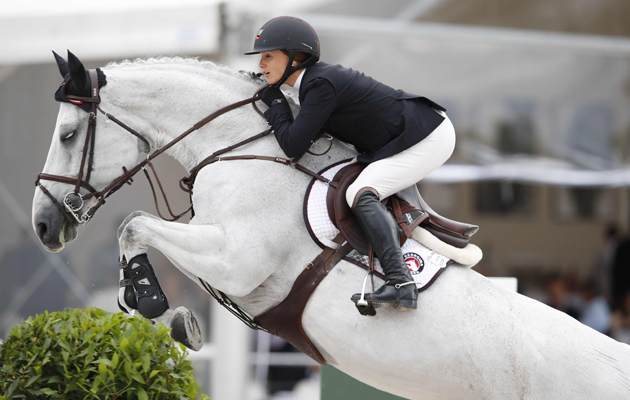
Georgina Bloomberg on her favourite mare, Juvina. “In competitions, there’s no space for bad losers. Because you always lose more classes than you win,”she says.
Ludger’s Many Likes
IT IS the horses who helped the German super star, Ludger Beerbaum secure his numerous trophies – three Olympic team gold medals (1988, 1996 and 2000) an individual Olympic gold from Barcelona in 1992 and two team gold medals from the World Equestrian Games to name just a few.
You say you don’t have a favorite horse – but which are in the top ranking? Ratina, Classic Touch, Gold Fever…..these are for sure my peaks. But then I also had Priamos, who was a really nice horse that I only had for two and a half years. Even a horse that was a bit a second rate; Figaro’s Boy, was nice and competitive. I don’t know how many horses I’ve had during the years. 250-300 when it’s just the ones I’ve been on to international competitions.
I’ve been lucky to have many good ones. If I just see all the horses I won championship medals with, even Glady’s, Champion de Lys, they were all very different. If a horse has courage and character, and it’s competitive you can live with different types of horses and blood. In the end; if they have a good heart and a good will, then that’s what is important.
Which is more important, your horses or your family? The family is number one, the horse is always second.
“I’m also not in love with my horses. I like them. Some people say, I love, I love, I love….but it is not the German way of interpreting feelings.”
I’m also not in love with my horses. I like them. Some people say, I love, I love, I love….but it is not the German way of interpreting feelings. I really like my horses and I’m a lucky guy to find a way and a job in this sport. But love and families are a little bit different.
Your family and the horses are nevertheless inseparable. My family is a part of the game. We live in the yard, so they are pretty much involved. But the travelling is not easy. I can’t go to all the shows. You have to have priorities and make compromises. The show is a vagabond life. In the end it is the family first, and the horses are a job.
Would you want your children to follow your path? I’m not sure, to be honest, if I want my kids to follow my path. Especially for the girls. It’s a hard life. If they really want to do it I wouldn’t say no. But I would definitely never push them.
How did you get into this sport in the first place? I was always really keen and I loved to go to competitions. When you’re young and you realize that you are becoming successful it’s like a drug; you like what you’re doing. And then once it came to a point where I had to decide whether I wanted to stay as an amateur, so I decided to try riding professionally for a few years. And that was it.
For how long will you go on? I won’t stay in this business forever, like some of these guys who are in their sixties. Because I’d really like to do something else at some point. It will always be something with horses but not riding every week because it gets kind of boring. I have some riders working for me already. I’d like to do a little bit of farming. I have some land in East Germany. I’d like to do some more there. I could do this for another 10-15 years and then it’s time to change. ©
Judy Ann & Christian
“We share our horses. Judy is riding a horse for me at this show. I have Taloubet which was her horse before. I have to find out with which rider he has the best results…When you ride in the same class, you walk the course, and you have your way of thinking, you talk about it and try to make a good plan for both of us. If you’re alone it is much more difficult.” Photo C. Alfthan
FOR SHOW jumping’s power couple, Judy Ann Melchior and Christian Ahlmann, the horses are everything. Just as being able to compete in the same shows.
You’re surrounded with some of the world’s best horses. But which horse is your favorite ? Christian Ahlmann: The best horse is the one that does best in the competitions. But the best horse for me is Costa, because he brought me up and he was my first successful horse. I rose to an international level thanks to him and he made me a European champion. I’m really thankful for what he did for me and for my whole career. That is why he is my favorite. For the moment I have Taloubet. He is amazing and perhaps even better but Costa will remain my favorite horse for the rest of my life. Today, he’s on the fields at home with the ponies.
Judy Ann Melchior: My favorite horse is Levisto. I had him now for 15 years so he’s going towards retirement. I think I have one more year with him. I’ve had other succesful horses but for me he’s really a big friend. He’s easy to ride, he fits well in my system and he’s mentally a fighter; so for me he’s really everything.
How long have you been a couple ? Christian: We’re now together for five years. We know each other from the shows. I’m ten years older. So we were not always on the same ones. Now we are a family. Our boy was born in August. It was a big step to have a child. Now we have a life together. Generally, I think it’s really important that your partner has something to do with the business or with horses; otherwise its going to be pretty difficult in the end.
Judy Ann: We’re lucky that we can often ride at the same shows and that we can travel as a family together to do the same stuff.
How did you deal with your pregnancy ? Judy Ann: I stopped riding immediately because I did not want to take the risk. And I started immediately afterwards. We have a maternity nanny who follows us around. In the daytime, she is at the shows with us and in the evening she goes to our hotel.
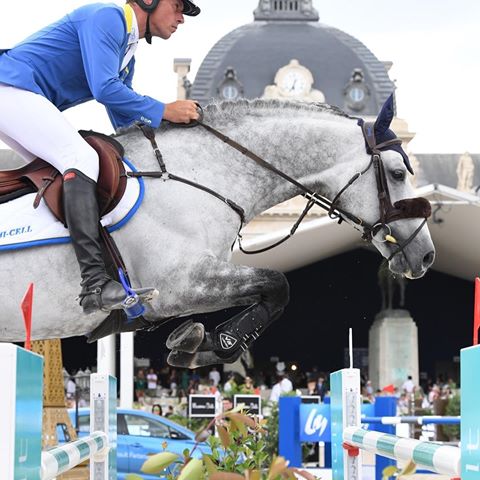
Christian and Clintrexo Z, photo LGCT
Has it affected the way you ride? Are you more careful ? Christian: I think it is the same. Maybe for Judy it is harder to come back. But in the end you dont think about your children when you are in the ring. You take the same risks and the same horses as before. For me it is for sure like that. And for Judy I think it is the same.
“In the end you don’t think about your children when you are in the ring. You take the same risks and the same horses as before.”
Judy Ann : We don’t ride because we think it is dangerous. For us it is something natural. But I did stop for nine months which interrupted the show rythm. After one month I was doing shows again and I’ve been quite successful. Maybe not competing for the first place but I’ve been placed well in the big classes. But you do loose a lot of rythm in nine months. So it is something you have to build up again. It’s only natural. For every job you have to rebuild after such a break.
Christian: For horses and riders it is the same. If you’re out for a while you’re not a hundred percent on. It takes time to get back.
Will you have another one ? Judy Ann: We’ll have a bigger family but right now it is perfect to just be the three of us. The bigger your family gets the more difficult it gets.
Do you ever fight over your results? Christian : We compete against each other all the time. It doesn’t make us fight, for sure not. I think it is the only sport where women and men compete together.
Judy Ann: When we’re both at the shows you have much more chance that at least one of us was good. So when Christian was riding alone for nine months his results were terrible. But when we’re together there’s alsways more chance that one will win.
“The sport has changed a lot in the past few years. Normally, our base is Belgium or Germany, and we travelled around shows in that area. Now we go to Brazil, to America, to Asia…it is a big difference from a few years ago.”
Christian : We share our horses. Judy is riding a horse for me at this show. I have Taloubet which was her horse before. I have to find out with which rider he has the best results. Sometimes with her, sometimes with me. It’s not really clear from the beginning. Judy has a different way of riding. I ride with much more pressure and my body has much more weight. For some horses it is good, for some horses it’s less good. When you ride in the same class, you walk the course, and you have your way of thinking, you talk about it and try to make a good plan for both of us. If you’re alone it is much more difficult to do it.
Judy Ann : We always talk about the sport and we always train our horses together and the whole logistic side is one. We both know each others situation really well and we know each others horses. Christian has been teaching me.
Christian : I train her more than she trains me but it doesn’t mean that we don’t always talk about it; she asks me and I ask her, it goes both ways. It is really good for both of us.
What do you think about the boys against girls class that was created for this show? Does it help popularize the sport? Christian : It really makes it clear for everybody that we have a sport where it is boys against girls all the time. This is something really special in our sport. We have the same classes and the same competitions.
Judy Ann : For the riders that particular class does not make any difference. But for the audience it is fun. They were very successful at making an elegant show. They have created a lot of interest in the public. It’s a good place for Gucci to come out with its image.
Christian : The sport has changed a lot in the past few years. Normally, our base is Belgium or Germany, and we travelled around shows in that area. Now we go to Brazil, to America, to Asia…it is a big difference from a few years ago. I think the horses can handle the trip really well, they don’t need two-three days to be back to normal. If they don’t know what it is it can be really difficult. If you have a 7-8 year old who tries it for the first time they can get travel illness – you have to be really careful. The Grand Prix horses have a certain age, they know the circuit and they can handle it well. ©
Interviews at the Longines Masters, Paris
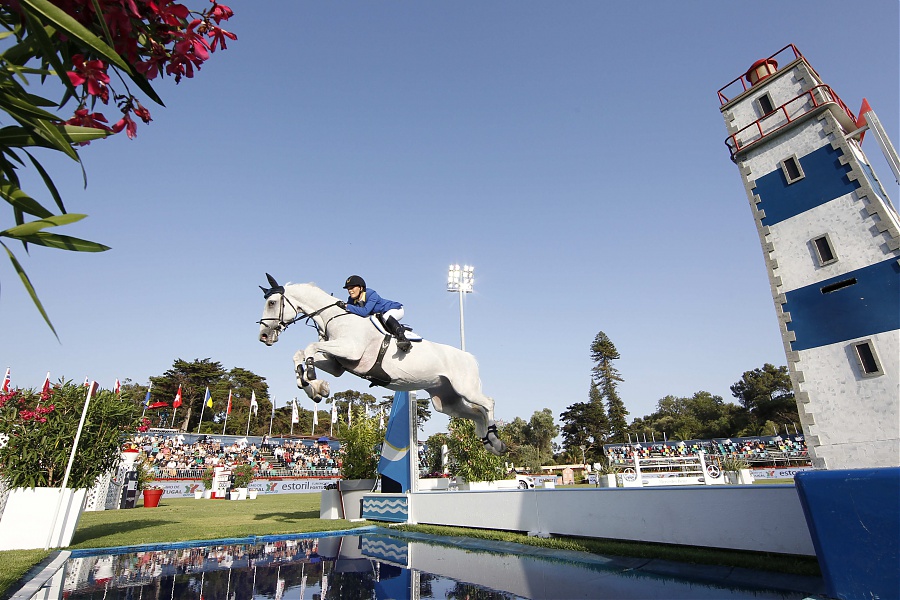 Judy Ann aboard Clintrexo Z, photo Stefano Grasso
Judy Ann aboard Clintrexo Z, photo Stefano Grasso
